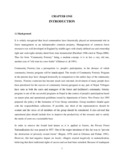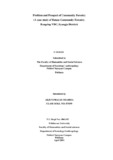Please use this identifier to cite or link to this item:
https://elibrary.tucl.edu.np/handle/123456789/549| Title: | Problem and Prospect of Community Forestry (A case study of Batase Community Forestry, Bangsing VDC, Syangja District) |
| Authors: | Sharma, Arjun Prasad |
| Keywords: | Community Forestry;sociology |
| Issue Date: | 2011 |
| Publisher: | Department of Sociology/ Anthropology Prithwi Narayan Campus Pokhara |
| Institute Name: | Prithivi Narayan Campus, Pokhara |
| Level: | Masters |
| Abstract: | Community Forestry is a people's participatory approach in which the local users of the forest are involved in paining, development, implementation, protection, production and user of forest resources. The concept of CF came into practice in Nepal in the late nineties (1998). At present, the CF program is launched in most of the area of Nepal. Although, community forestry program is one of the effective programs of Nepal, different scholars have pointed out some problems in the implementation of CF through their discussion paper and research work. Some problems related to the research have been explained in the literature review. Most of the scholars have mentioned complex social and economic structure of Nepal as major affecting factors in CF program. Problems resulted from lack of education, economic status, caste structure of the society, gender inequality and cultural values are identified in different literature. During the research of Batase Community Forestry (BCF), the researcher has set some research questions, which are (I) how the diversity of cultural group and interest group obstructs on the institutional process, (ii) how people are participating in implementation process of CF, (iii) how all interest group are taking part in the process of decision -making and benefit- sharing, (iv) what are the problem and prospect in the CF, (v) how FUG is trying to manage conflicts and (vi) What factors and characters are required for the resolution of conflict. The main objectives of this research are: to assess the institutionalization process of CF, to identify problem and prospect of CF and to find out the point of conflicts among user groups. To fulfill the objectives, Batase CF is selected as research area. 40 household members are taken as sample and other key informants like ranger, teacher and VDC members were visited. Tools like observations, formal and informal discussion, interview, and case study are used to collect the necessary information. For more information, primary data as well as secondary data i.e. arithmetic mean and percentage are used for quantitative data analyses. This study is based on Batase CFUG. This CFUG is selected purposively among 5 Community Forests of Bangsing VDC because it is the oldest CF of this VDC. There are various types of caste and cultural groups who are the users of CF. Batase FUG are multi ethnic/caste group where Brahman, Chhetri, Rana, Kami and Dorji work together. Brahman is in majority group and the minority group is lower caste group. There are 80 benefit house- holds. They are all Hindu. Brahman and Chhetri are economically rich, educationally ahead and forward in leading than other casts groups because majority of Brahman have dominated the forest user committee. Brahmans have managed to extend their occupation, in different organizations of government and non- government sectors whereas, the main occupation of Kami and Dorji is labor work in construction as carpenter and agricultural labor. Most of the kamis are depending on their occupational job of Arann (traditional technology). The Batase CFUGS has made operational plan and constitution with the help of the District Forest Officials. They have made rules for protection, management and benefit sharing with the help of ranger and CF. The study area is managed by following those rules and regulations. Leadership has been taken by Brahman. The community participation of Brahman is higher than other groups. Rana, Kami and Dorji, users are found inactive. They have less interest and awareness towards CF activities. High level of women participation is active to collect forest product but inactive in leading power. Community forestry program no longer remains free from conflict. Unequal and inequitable benefit of boundary, and conflict with DFO for imposing strict terms and conditions, conflict between/ among ethnic/ castes groups conflict between male and female are some major causes of conflicts that have been found in Batase community forestry. Definitely, the CFUG has been facing some conflicts but they have not caused any serious effects on the program. Almost all the respondents have been found satisfied with the activities and management system. Another conflict, the CFUG is facing so far is that the neighboring villagers have their main road within the boundary of the CFUG. They have been found to encroach the forest around their land. The users have some dissatisfaction to the DFO for not providing the financial support for the forest watcher and for thinning and purning activities. |
| URI: | http://elibrary.tucl.edu.np/handle/123456789/549 |
| Appears in Collections: | Sociology |
Files in This Item:
| File | Description | Size | Format | |
|---|---|---|---|---|
| Chapter Page(1).pdf | 283.9 kB | Adobe PDF |  View/Open | |
| Cover Page(6).pdf | 33.9 kB | Adobe PDF |  View/Open |
Items in DSpace are protected by copyright, with all rights reserved, unless otherwise indicated.
